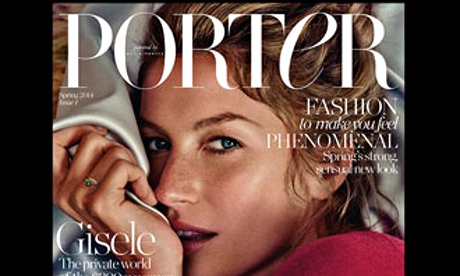
Magazine publishers see Thursday's ABC figures as a step forward. For the first time they managed to convince the bureau to add the circulation figures for their digital editions to the numbers for the paper editions of the same title.
Anyone looking for evidence of readers migrating in an orderly fashion from paper to point-and-click will be disappointed. The magazines with the most significant percentage of their sales on tablet or phone were in a relatively narrow band of predominantly male interest titles – such as T3 (42.3%), Stuff (19.33%), GQ (9.58%), Top Gear (8.8%) and the Economist (5.72%) – and some of the other percentages hinted at less than transformational change.
Beyond the business class lounge neither readers nor advertisers seem to have a massive appetite for a new form of delivery. Vogue sells 192,763 print copies compared to 8,314 digital ones, Good Housekeeping 410,981 compared to 3,561. TV Times only sold 217 "copies" on digital compared to 254,376 on paper. It's not the only title that can't decide whether to stick or twist. Look at it from the publishers' point of view. Are they moving from one format to another or contemplating a future where the complexity increases but the revenue doesn't?
Into this cauldron of uncertainty comes Porter, the new six-issues-a-year glossy from the people at upmarket fashion site Net A Porter, courageously priced at £5 for 284 pages against its rival Vogue's doormat-crushing 440 pages for a bargain £3.99. Porter is obviously accompanied by a tablet version, via which you can purchase expensive fashion items, as an increasing number of women like to do.
The incumbent titles are watching its arrival with the usual combination of dry indifference and sheer terror. Vogue editor Alexandra Shulman said it "sounded like a grand Sainsbury's magazine". What they're all no doubt thinking is, can there be enough upmarket advertising to go round?
I've always taken the view that the world of fashion simply didn't exist without the glossy magazines that served it. They defined it, sorted out its hierarchy, handed out its prizes, chronicled its most minute shifts and tantrums and were prepared to fawn over its stars in a way that would have made the most sycophantic Versailles courtier blanch. They also played a crucial role in making its products seem worth the money. A legendary piece of research showed people the same dress in a newspaper as they saw in a posh magazine. In the latter they thought it was worth £100 more. They called it "the presenter effect". In the past the mavens of Milan have bought into the same idea.
The world has moved on. Once your sole window on Victoria Beckham was when she revealed some massively significant new haircut in the pages of Elle. It's difficult to properly emphasise how much social media has cooked that particular goose. It's also difficult to believe that we gawp in adoration at Porter star Uma Thurman quite as much as we did in days of yore, although anybody who can expect us to believe that they're stirring the stock pot while a small child sits at their feet, shod in Stella McCartney sandals (£540), has certainly got some neck.
Nevertheless, as the publishers have noted to their surprise, these advertisers still appear to believe in the charisma of paper. It doesn't much matter what any media commentator says about Carole Radziwill's underwhelming thoughts on mystique, the 18 pages of white lace for spring or whether there is anything that David Bailey hasn't already said about fame, the pages of Porter that really matter are the 26 between the cover and the first page of editorial, which are occupied by Chanel, Ralph Lauren, Gucci, Armani, Dolce & Gabbana and others in an order which has no doubt been the subject of much arm-wrestling.
The only thing that matters is how much those people have paid and whether they're minded to come back once their opening series deal has expired. For the moment they appear to support my theory that magazines still play an indispensable role in creating the mystique that sustains the fashion process.
Mind you, there was a time I would have said much the same about the music business and music magazines. In Britain, particularly, they were a key cog in what Joni Mitchell called "the star maker machinery behind the popular song". In recent years they've slid away to such an extent that the NME now sells less than 20,000 copies a week and Q, which once sold over 200,000, is lucky to hit 50,000. Rock stars are still being created but I don't think it's mere nostalgia that tempts me to point out that there hasn't been a real star rock group since the decline of the rock press. Jake Bugg? I rest my case.

